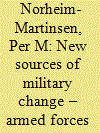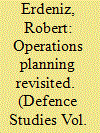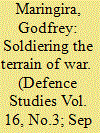|
|
|
Sort Order |
|
|
|
Items / Page
|
|
|
|
|
|
|
| Srl | Item |
| 1 |
ID:
145859


|
|
|
|
|
| Summary/Abstract |
Militaries rely on secure communications. Despite the permeation of cyber-systems throughout the operational environment, there is little readily available doctrine on cyber-warfare. Doctrine that does exist has not been coherently integrated. This paper introduces a Cyber Conceptual Framework, consisting of five questions pertinent to the future use of cyberspace. The authors enunciate a definition of cyberspace, expand on existing military doctrine to reject the conceptualisation of cyberspace as a domain, define cyber-conflict, define cyber-attack and describe the four components and five levels of a cyber-attack. This work develops a common framework from available doctrine and a lexicon for future discussion.
|
|
|
|
|
|
|
|
|
|
|
|
|
|
|
|
| 2 |
ID:
145857


|
|
|
|
|
| Summary/Abstract |
This article aims to analyze the Brazilian Defense Policy in terms of its ability to reduce the gap between ends and means. Since 2003, the Brazilian defense policy has evolved along with Brazil’s increased role in the international system. Sustaining this process depends on institutional, economic, and operational conditions that are yet to be fully guaranteed. They require negotiations, reforms, and strategic perspective. By identifying specific challenges emerging from the national security institutional framework, the combat capability building process, the budgetary cycle, as well as from the defense industrial base, we sought to explain their rationale and to offer concrete policy pointers to overcome obstacles. As a general conclusion, the Brazilian defense policy was strengthened by the 2008 National Defense Strategy (END) due to its clearer strategic goals. Bridging the gap between those ends and the proper means is a continuous effort for any given country, but in the case of Brazil it has been addressed with firmer steps since the END, even in the face of harder economic and political conditions.
|
|
|
|
|
|
|
|
|
|
|
|
|
|
|
|
| 3 |
ID:
145856


|
|
|
|
|
| Summary/Abstract |
This paper examines statistical data on the employment of women in the British armed forces. It reviews some of the issues shaping debates about women’s military employment, in order to establish the on-going significance of the topic. It looks at patterns of female military employment across the three services, and places discussion of this in the context of observations about gendered divisions of labour in the wider UK labour market. It examines data for the gendered divisions of labour within different corps, branches and occupational groups within each of the three armed services, and looks at gender patterns across ranks. It concludes by discussing the implications of these findings for both policy and conceptual work on women’s military participation.
|
|
|
|
|
|
|
|
|
|
|
|
|
|
|
|
| 4 |
ID:
145861


|
|
|
|
|
| Summary/Abstract |
The literature on how European states have adapted to the post-cold war security environment ffocuses invariably on different understandings of military transformation, a process which is seen as inherently different from other forms of organizational change. However, as this paper argues, new management practices, going back to the introduction of so-called New Public Management (NPM) reforms throughout Europe in the 1980s, have eventually penetrated also the last bastion of the old state – the defense sector. Taking a critical approach to the idea of military transformation and existing theories of military change, the paper demonstrates how other international developments have pushed towards what may be seen as a “normalization” of Europe’s defense sectors. This has important implications for how we approach and understand change in contemporary defense organizations.
|
|
|
|
|
|
|
|
|
|
|
|
|
|
|
|
| 5 |
ID:
145858


|
|
|
|
|
| Summary/Abstract |
Parts of NATO’s contemporary planning framework called the comprehensive operations planning directive (COPD), and parts of the operation-level planning process should be revised since they suffer from methodological inconsistency. This claim is defended by discussing contradicting methodological properties and heuristics applied when framing and managing a military problem in accordance with the COPD. The methodological inconsistency within the COPD; in other words, simultaneously applying contradictory methodological properties, implies one theoretical and three practical implications. The theoretical implication is summarised in a meta-theoretical framework and explained by discussing five methodological properties: non-linearity, emergence, independently changeable generalisations, invariance and boundaries. The three practical implications of methodology imply that methodology is guiding: the problem-frame, conceptual development and action. To improve military planners’ understanding and management of these four identified implications, NATO is recommended to develop a “handbook of methodology.” The purpose of such a handbook should be to emphasise the utility of methodology when planning military operations.
|
|
|
|
|
|
|
|
|
|
|
|
|
|
|
|
| 6 |
ID:
145860


|
|
|
|
|
| Summary/Abstract |
The paper reveals how Zimbabwean soldiers who fought in the Democratic Republic of the Congo (1998–2002) were challenged by the terrain of war. While soldiers are trained to live and fight in dreadful wars, I argue that immersing oneself in the war terrain is neither mathematical nor calculative; rather, war tactics to be employed are defined by the context in which soldiers operate in. When soldiers reflect on and about the war, they unconsciously produce accounts that are often not completely heroic, but a life lived in fear as well an issue that they had never anticipated when they set out to war. A main finding of this study is that while these soldiers were deployed to fight against the rebels, they find difficulties in locating physical features from map reading to the ground, distinguishing the enemy from civilian people and deployed for days without eating a proper meal as well as seeing their fellow soldiers dying in the context of war. The paper provides a vantage point in which we can also understand that trained soldiers do not exert total power over war terrains, they are sometimes challenged by the war situation itself.
|
|
|
|
|
|
|
|
|
|
|
|
|
|
|
|
|
|
|
|
|